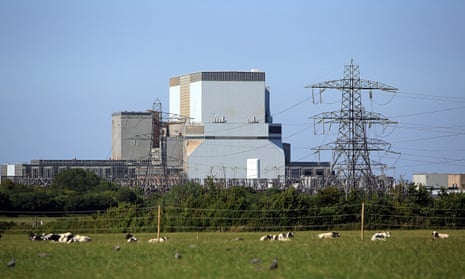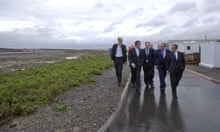British plans for a nuclear renaissance centred on a nuclear reactor in Somerset achieved a breakthrough when a nine-month European Union state aid investigation ended with a call for Brussels to approve the project.
The EU’s competition commissioner, Joaquín Almunia, had expressed scepticism that the Hinkley Point C scheme could satisfy the EU’s stringent state aid criteria after the UK government agreed to underwrite the project with a loan guarantee and a commitment on the price of the electricity generated by the power station.
But the commissioner appears to have been persuaded that the proposed £17.6bn of subsidies are legal under bloc rules, despite the lack of a competitive tendering process. Hinkley Point will be operated by EDF, the French state-owned company, while two Chinese state-owned nuclear companies have agreed to help fund the plant.
A spokesman for Almunia told the Guardian that after discussions with the UK authorities, he would “propose to the college of commissioners to take a positive decision and in principle the decision should be taken during this mandate of the commission in October”. It follows a meeting between the energy minister, Ed Davey, and Almunia in Brussels last Wednesday. UK sources refused to be drawn on the nature of any agreement reached between them, and cautioned that nothing has yet been decided.
The leak from Almunia’s office was seen by some analysts as unorthodox – no public announcement is usually made until a decision has been agreed.
According to EU protocol, the proposal from the investigating team will now go to a college of EU commissioners for a final decision next month.
Some of them, such as the German energy commissioner, Günther Oettinger, who once described the 35-year length of the proposed Hinkley contract as “soviet”, may require convincing.
Aled Williams, a UK government spokesman in Brussels, said: “We are continuing to engage with the commission as it progresses its assessment of the Hinkley Point C state aid case and are confident of a decision under the mandate of this commission.”
But British pressure related to the UK’s electoral timetable – and the potential for an easy campaigning hit for Ukip – may have led Almunia to backtrack from his previous misgivings, according to some environmentalists. “If Almunia has backed state aid for Hinkley, it risks a backroom deal prevailing over the rule of law,” said Mark Breddy, a spokesman for Greenpeace Europe. “Only a year ago the commission said that Hinkley was ‘in principle incompatible under EU state aid rules’. Now, under pressure from the UK government and French nuclear operator EDF, the commission is preparing to perform a U-turn.”
The president of the Green parliamentary group in Brussels, Rebecca Harms, said she was disappointed with the investigation’s outcome.
“It is unbelievable that Commissioner Almunia wants to wave through this obviously illegal state aid to finance Hinkley Point,” she said. “It is like the bursting of a dam – other countries will want to follow. The financing of such outdated, dirty and highly risky technology should be averted by all means.”
However, the Confederation of British Industry hailed news of what could be the first British nuclear plant in a generation. “This deal has been a long time in the making, and will play a significant role in further securing and decarbonising our energy supply,” said Nicola Walker, the CBI’s business enviroment director. “We hope it will also help kickstart a new nuclear build programme, creating jobs for tens of thousands of people.”
If built, Hinkley would be the first British nuclear reactor since Sizewell B in 1995. Because of the 35-year length of its operating contract, and the 10 years it would take to build, its cost and policy implications stretch far into the future.
“It would be the beginning of the end of the single energy market in Europe,” said Mark Johnston, an external adviser to the European Policy Centre thinktank. “If member states are free to purchase any power plant with long-term subsidies, then there is no longer a role for companies to judge investments.”
The government has offered EDF a “strike price” of £92.50 per megawatt hour for Hinkley, roughly twice the current wholesale price. It has also offered £10bn in loan guarantees. It is providing a range of incentives, including support for wind power and biomass, to attract £110bn needed to replace current generating capacity and upgrade the national grid.




Comments (…)
Sign in or create your Guardian account to join the discussion